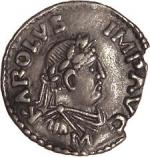Disable ads!
Charlemagne
Carolingian dynasty Pippinids Pippin the Elder (c. 580–640) Grimoald (616–656) Childebert the Adopted (d. 662) Arnulfings Arnulf of Metz (582–640) Ansegisel (d. 662 or 679) Chlodulf of Metz (d. 696 or 697) Pepin of Herstal (635-714) Grimoald II (d. 714) Drogo of Champagne (670–708) Theudoald (d. 741) Carolingians Charles Martel (686–741) Carloman (d. 754) Pepin the Short (714–768) Carloman I (751–771) Charlemagne (742–814) Louis the Pious (778–840) After the Treaty of Verdun (843) Lothair I, Holy Roman Emperor (795–855; Middle Francia) Charles the Bald (823–877) (West Francia) Louis the German (804–876) (East Francia) This box: view talk edit Charlemagne (/ˈʃɑrlɨmeɪn/; 2 April 742/747/748 – 28 January 814), also known as Charles the Great (Latin: Carolus or Karolus Magnus, French: Charles Le Grand or Charlemagne, German: Karl der Große, Italian: Carlo Magno or Carlomagno) or Charles I, was King of the Franks who united most of Western Europe during the Middle Ages and laid the foundations for modern France and Germany. He took the Frankish throne from 768, became King of Italy from 774, and from 800 was the first recognized Roman emperor in Western Europe since the collapse of the Western Roman Empire three centuries earlier. The expanded Frankish state he founded is called the Carolingian Empire. The oldest son of Pepin the Short and Bertrada of Laon, Charlemagne became king in 768 following the death of his father. He was initially co-ruler with his brother Carloman I. Carloman's sudden death in 771 under unexplained circumstances left Charlemagne as the undisputed ruler of the Frankish Kingdom. Charlemagne continued his father's policy towards the papacy and became its protector, removing the Lombards from power in northern Italy, and leading an incursion into Muslim Spain. He also campaigned against the peoples to his east, Christianizing them upon penalty of death, at times leading to events such as the Massacre of Verden. Charlemagne reached the height of his power in 800 when he was crowned Emperor of the Romans by Pope Leo III on Christmas Day at Old St. Peter's Basilica. Called the "Father of Europe" (pater Europae), Charlemagne united most of Western Europe for the first time since the Roman Empire. His rule spurred the Carolingian Renaissance, a period of cultural and intellectual activity within the Catholic Church. Both the French and German monarchies considered their kingdoms to be descendants of Charlemagne's empire. Charlemagne died in 814, having ruled as emperor for just over thirteen years. He was laid to rest in his imperial capital of Aachen in what is today Germany. His son Louis the Pious succeeded him.
 Read more on wikipedia.org Read more on wikipedia.org
 All quotes by Charlemagne All quotes by Charlemagne
 Edit Edit
|

|
|
|
|
|
Background photo by Giuliana
|